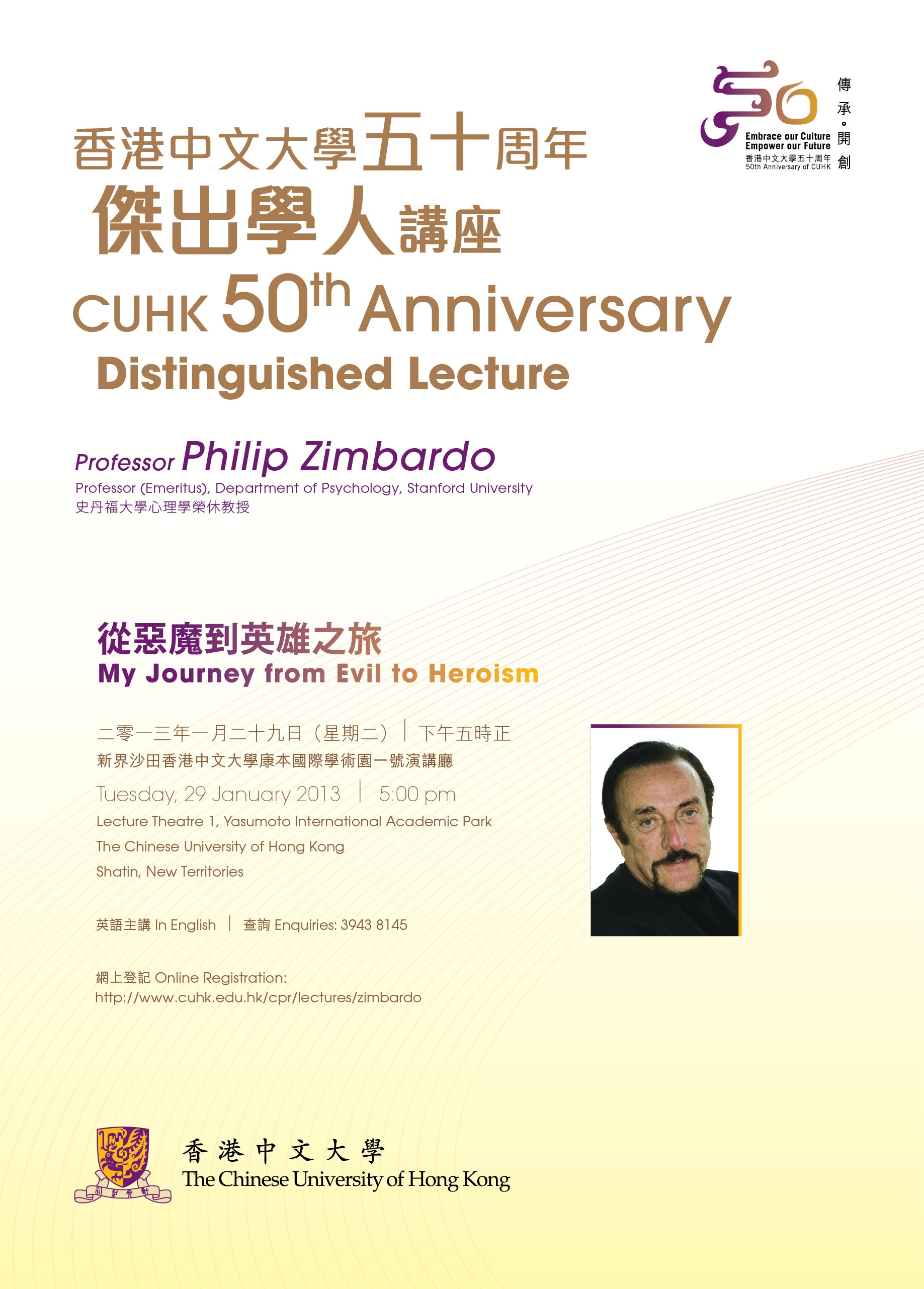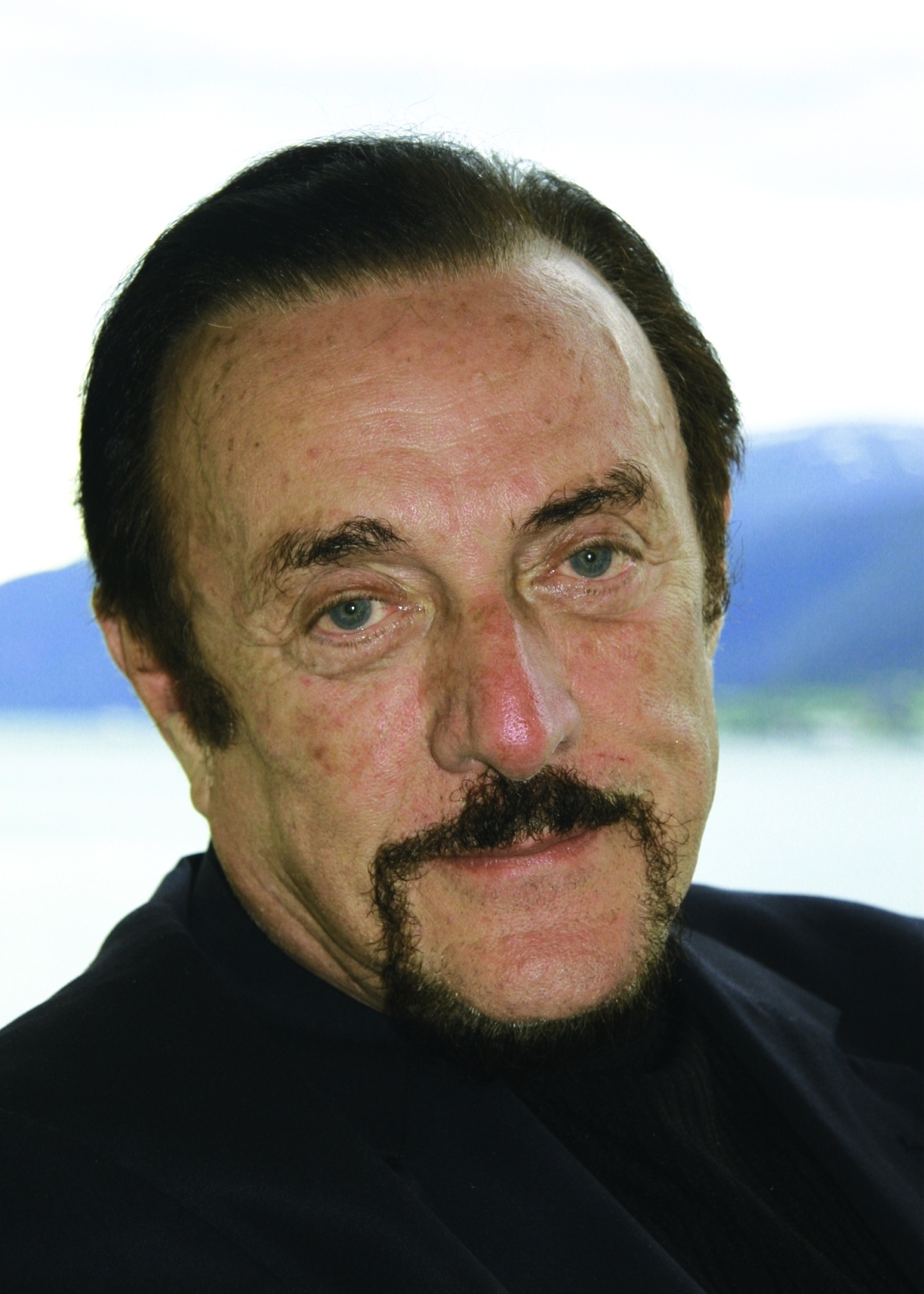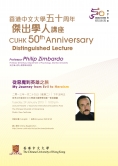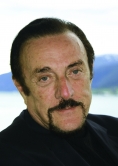CUHK
News Centre
CUHK 50th Anniversary Distinguished LectureRenowned Contemporary Psychologist Philip Zimbardo to speak on ‘My Journey from Evil to Heroism’
The Chinese University of Hong Kong (CUHK) is privileged to have invited Prof. Philip Zimbardo, Professor (Emeritus), Department of Psychology, Stanford University, as a guest speaker for the University’s 50th Anniversary Distinguished Lecture. Professor Zimbardo will present a lecture on ‘My Journey from Evil to Heroism’ next Tuesday (29 January) on campus, to share insights into exploring and encouraging the psychology of everyday heroes, through which individuals can initiate positive changes in their own lives as well as that of their society as a whole. The lecture has got overwhelming response and was oversubscribed within three days after the public announcement was made.
Prof. Philip Zimbardo is internationally recognized as the ‘voice and face of contemporary psychology’ for his remarkable contributions to the psychology profession. More than an educator and researcher, he is also a well-known writer and media contributor who strives to ‘give psychology away to the public’. His widely viewed PBS-TV series, Discovering Psychology, and his best-selling trade books have greatly promoted public’s understanding of psychology. Professor Zimbardo’s current research interests are in the domain of experimental social psychology, with a scattered emphasis on everything interesting to study, including violence, political psychology and terrorism.
As a kid growing up in the inner city ghetto of the South Bronx, New York, Professor Zimbardo wondered why his good friends turned bad and were corrupted by the evil that tempted them, which he himself was able to resist. In 1970’s, Professor Zimbardo conducted his classic research, ‘The Stanford Prison Experiment’, in which two groups of participating college students respectively played the role of prisonsers and guards. His research question was: When good people are put in a bad place, does their good personality and character dominate, or are they dominated by powerful, subtle situational forces? The experiment generated the negative conclusion about bad barrels corrupting good apples, which has a profound impact on the psychology community.
Extensive research findings of Professor Zimbardo suggest that our thoughts, feelings, and behavior are profoundly influenced by social and situational cues around us. In recent years, he has shifted to wonder if and how ordinary people can become ‘everyday heroes’. He has set up a non-profit corporation in San Francisco, The Heroic Imagination Project, whose mission is to explore and encourage heroic action from people of all ages and nations by internalizing and acting on a vibrant Heroic Imagination. His project teaches people how to overcome the social and psychological forces (e.g. the human tendency to watch and wait in moments of crisis) and to promote the well-being of others (e.g. oppose inequality) for a better tomorrow. He believes the habits of acts of heroism can be learned and become a lifestyle.
Led by the Vice-Chancellor Prof. Joseph Sung, the I‧CARE Programme recently launched by CUHK which promotes students’ social responsibility and civic participation, shares the same vision as Professor Zimbardo’s Heroic Imagination Project. Through Professor Zimbardo’s sharing, the University hopes to enlighten its members and the public on ways to shape a better future for the world, echoing the objective of the anniversary celebrations.
Professor Zimbardo has been a Stanford University professor since 1968, having taught previously at Yale, New York University, and Columbia University. He also continues to teach psychology of terrorism at the Naval Post Graduate School in Monterey, and is professor at the Palo Alto University teaching social psychology. Professor Zimbardo has been given numerous awards and honours, including the Vaclav Havel Foundation Prize for his lifetime of research on the human condition, as well as the recent APA Gold Medal for Lifetime Achievement in the Science of Psychology (2012). He has been President of the American Psychological Association (2002), President of the Western Psychological Association (twice), Chair of the Council of Scientific Society Presidents (CSSP), and now Chair of the Western Psychological Foundation, as well as the Director of the Center for Interdisciplinary Policy, Education, and Research on Terrorism (CIPERT).
Professor Zimbardo has more than 400 professional publications, 50 of them are trade and textbooks, in which Psychology and Life is among the oldest current textbooks in psychology. His popular book on shyness in adults was the first of its kind, as was the shyness clinic that he started in the community and continues as a treatment-research clinic at the Palo Alto University. His recent trade books include The Lucifer Effect: Understanding How Good People Turn Evil, The Time Paradox: Reconstructing the Past, Enjoying the Present, Mastering the Future (with John Boyd), The Demise of Guys (with Nikita Duncan) and Time Heals: The dynamic new treatment for PTSD (with Richard and Rosemary Sword).
Lecture synopsis and biography of Prof. Philip Zimbardo:
cmscprcpro.azurewebsites.net/en/events_detail.php?1=1&id=3337







